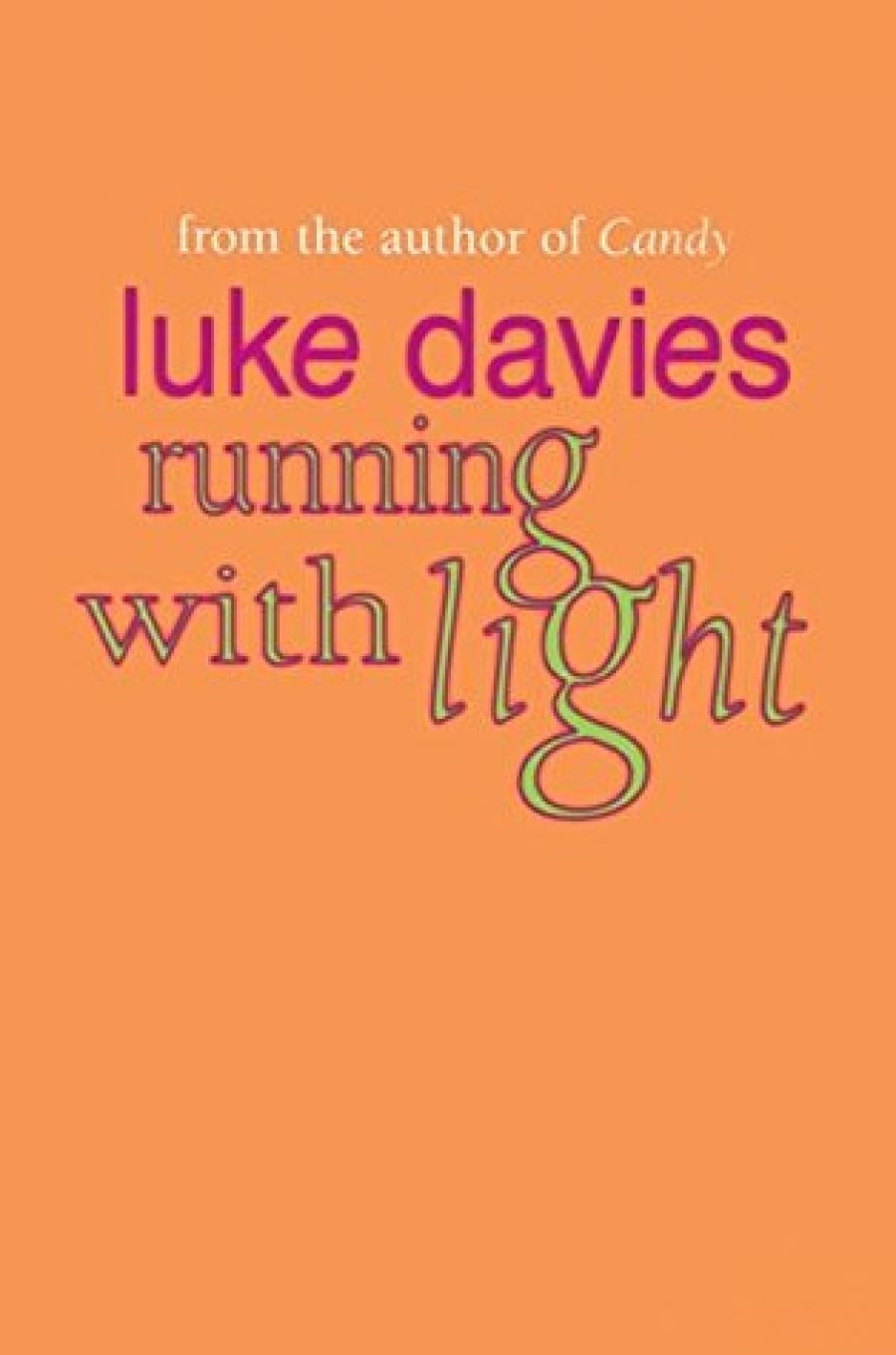
- Free Article: No
- Review Article: Yes
- Online Only: No
- Custom Highlight Text:
Just when you have been assured, and have believed, and have claimed in print in The Sydney Morning Herald that mainstream publishers no longer bring forth volumes of verse by individual poets, along comes Allen & Unwin to confound you. Well, it is good thus to be confounded. I might not have pointed out, but the publishers remind us, over Luke Davies’ name and over his title, running with light, that this book is ‘from the author of Candy’ (also published by Allen & Unwin). So, we have a case of prose piggybacks poetry, which is all right by me. Those who read Candy, that antipodean version of Romeo and Juliet on smack, for prurient reasons may, however, find running with light not their cup of tea or drug of choice. Those, on the other hand, who responded to Mr Davies’ absolute control over and cool towards his fevered material, will warm to this collection of poems. Candy was, assuredly, a poet’s novel.
- Book 1 Title: running with light
- Book 1 Biblio: Allen & Unwin, $19.95 pb, 107 pp
As was the case with his earlier collection, Absolute Event Horizon (1995), running with light celebrates a marriage of Science and the Human(ities) or Human Sciences, if you prefer. His title comes from Arthur Zajonic, Catching the Light: The entwined history of light and mind: ‘Think back to Einstein’s first thought experiment – running with light ... Light has no place, but it does have a speed and we are always separated from it by 299,792,458 metres per second.’ At times I think that I would like to read Paul Davies’ review of this book, with its references to ‘neutrinos’ and ‘photons’. If a general dictionary (Collins, 1979) informs me that a ‘neutrino’ is ‘a stable leptonic neutral elementary particle with zero rest mass and spin 1/2 that travels at the speed of light’, then I definitely need Professor Davies’ help, as well as Luke Davies’ poetry.
Luke Davies, I hazard, believes, like other poets before him, that we can understand the universe through poetry. What distinguishes Mr Davies from many other poets, however, is that he recognises, as did Miroslav Holub, that part of the universe which poetry must understand is that universe understood through physics. As Holub, Czech poet and clinical pathologist who died last year, wrote in ‘Zito the Magician’ – Zito, having changed water into wine and frogs into footmen to amuse the Emperor, when asked to ‘think up sine alpha greater than one’, responds: ‘Terribly sorry. Sine is between plus one and minus one. Nothing you can do about that.’ This is a brute necessity that physicists and poets must ignore.
What, then, does poetry do? In ‘Rain’, Luke Davies maintains:
The rain falls softer than spiders’ webs,
and only late at night, for five minutes, at
the height of isolation, does it drum. And only
poetry matters then, snatching heat and healing
from the jaws of decay.
There are times when, for Luke Davies, to be a good poet is to be a bad scientist. Take the opening, post-‘Generation of ‘68’ simile from ‘Summer’: ‘The sky broods like the whole of Sydney’s / done something wrong and it can’t quite put its finger / on it.’ Think what Alain Robbe-Grillet would have said about that! I have no argument with the Pathetic Fallacy, but it is a fallacy nonetheless; a scientist would have known better, or different. The poet also responds to the universe emotionally. If, for the scientist, via Zajonic, ‘this is what infinity is like. No matter how far toward it or away from it one travels, it remains the same infinite distance away.’, Luke Davies in ‘Fortune of the Shipwrecked’ speaks of
The infinite sadness of finite joys
in the season of rain and death
when the magpies sing.
Though much of running with light is sober (not sombre), Luke Davies does permit himself the occasional drollery. In ‘Sea Shanty II’:
Minesweeper’s prayer:
from things that go bump in the night,
deliver us.
The second of the two sections of this book is tided, ‘Still Life’. This perhaps refers to the tradition of nature morte on the one hand, and continuity on the other, where ‘still’ may suggest ‘yet’. This duality is echoed in the anagram in the first poem of the sequence, ‘Weather’:
Breathing and dreaming sustain you through despair
in the tepid atmosphere of the gnarly day
that is what way weird and way wired means.
Poetry, it hardly needs saying, is a form of dreaming, just as physics may be.


Comments powered by CComment